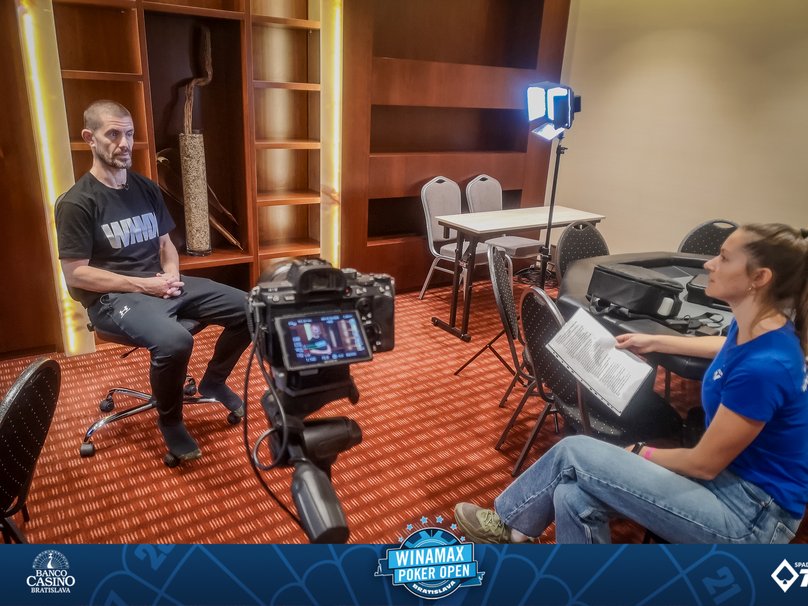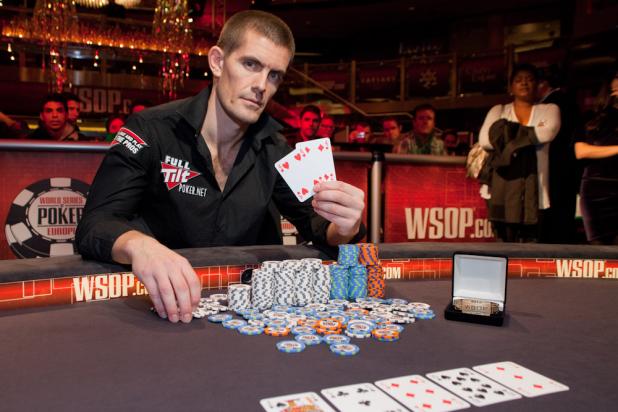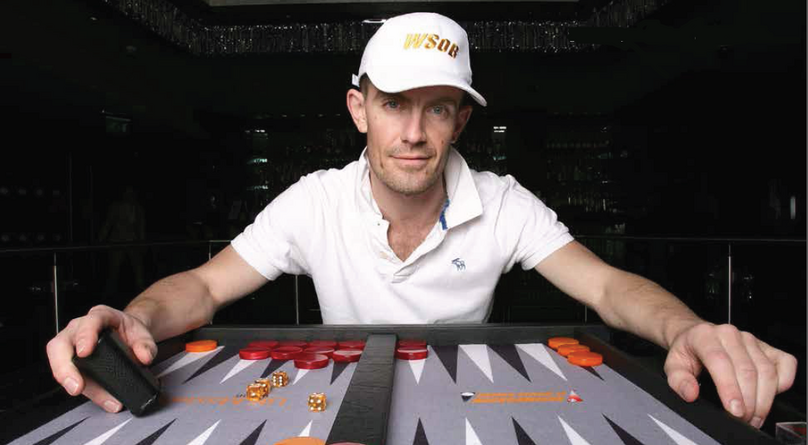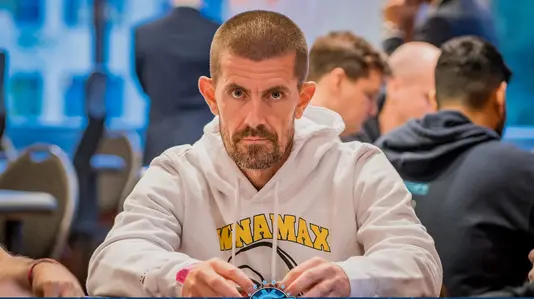Gus, It is written everywhere you retired in 2014 and went back to Denmark, where you began to focus on your family. What have you managed to accomplish during this time?
Well, first, I would say I did not retire in 2014, but I don't think I played in many tournaments from 2014 to 2019. However, I still played a lot of cash games when I was in Vegas. Even though I spent a lot of time in Denmark, I was still playing poker professionally. So, I was still on a poker schedule. I had some other small business adventures, mostly focused on poker. In 2020, I had a little son, and with COVID, I didn’t play much poker during that time. Over the last year and a half, I’ve started returning to the World Series of Poker in Vegas, and now I’m joining the Winamax team. I’m very happy about that. I feel like I’m getting back into the swing of things, playing some tournaments, had a final table in the WSOP, and hopefully, I can win a tournament or two along the way.

What happened that you returned to tournament poker and you can be in swing now?
Basically, I would put that on Winamax. I mean, I really didn’t play a lot of tournaments, but I had a lot of friends on the team and talked with them in December when I was in Vegas. It was like, 'Hey, I’m going to play a tournament at the December WPT.' They actually tried to film me. I didn’t do very well, so it was a very short film. But nonetheless, we kept talking. I joined the tournament even though I got knocked out very early, and I thought maybe I should start playing more tournaments. So it was a combination of trying to play one, getting back into the process of playing poker tournaments, and then marriage with Winamax.
Was the beginning for you difficult?
You could say so, because tournament poker has changed. Obviously, nowadays in 2024, people study more; there are software tools and computers. A lot of people have gotten much better, and I haven’t played much No Limit Hold’em, so you could say it’s kind of like starting over. It’s a tough game, and there are some really, really good players out there, so I have to play well to succeed in tournaments.
Can you compare poker from the early years when you first started to how it is nowadays? What do you consider more difficult?
Definitely I would say, people have a better idea what hands to play in which situation. They have a better balance that they had back in 2003. Back then people were just tight and you could kind a take advantage of that by being very aggressive. If everybody in the table are tight you could probably be profitable. If everybody has a better balance like in nowadays, you have to be much better in reading your opponents knowing who that guy is. So it definitely takes more skill to accomplish winning tournament today. I am hopeful I will get back on top.

And what about easier part?
I do not know if there is anything easier about poker tournaments. I still have to read the opponents, but they also read you. I know what they think because everybody thinks Gus Hansen is absolutely crazy. In that sense I have a good idea what everybody thinks about me at the poker table. So that is the easier part.
Did your aggressive strategy change during time?
It definitely has to change depending on how your opponents perceive you. I’m still trying to find my own balance because, well, it’s poker—there are different styles of play. Some are aggressive, some are super aggressive, and some are more like Daniel Negreanu, who likes to keep the pot small and make different kinds of plays. So you kind of have your own style. I don’t think I could play like Daniel Negreanu, and I don’t think he would want to play like me. So, in that sense, I still have to wrap my head around exactly how I want to do here on my comeback.
Let´s take a look at your past. You started to play backgammon, you spent an entire summer perfecting your skills and learning strategies. You organized tournaments on school grounds, and you became the best player. How did you became the best player in backgammon at high school?
Going back to high school, I guess it was 33 years ago, and Denmark has probably been the best backgammon country in the world for the last 35 years. There are so many places to play, a backgammon federation, tournaments all over, and team tournaments. There are weekly tournaments and team tournaments throughout the year. There are really a lot of opportunities, which creates a great environment to learn. It was easy for me because it was a passion. I was in high school, and, of course, you don’t want to do homework—there are more fun things to do, and one of them was playing backgammon. There were also a lot of tools to help me get better. After I finished high school, some people normally take a year off to travel, and I travelled with backgammon.
Why did you stop playing backgammon and start playing poker?
Basically, backgammon is more personal. Especially if you and I play together, and if you always lose, at some point it’s not that much fun to play. Whereas in poker, sometimes you have eight players at the table; sometimes you lose, and sometimes you win, but you don’t exactly know how everyone else at the table is doing. Maybe you know that Gus wins more than he loses, but it’s not as personal as sitting across from just one other player at backgammon. So sometimes it was hard to get a game going. Additionally, the poker community is much larger. There are so many tournaments and more players, which creates many more opportunities. I still play backgammon, but more recreationally.
How do you remember your early days in poker and your times of greatest fame? Would you still play in Bobby's Room with old friends? Which stars from that era are still your friends today?
I would say I did play with movie stars back in those days, but it was once in a blue moon. Basically, that movie Rounders with Matt Damon came out to Vegas and he played the Main Event, so I played with some of those guys. Some of them are still my friends, like Daniel Negreanu, Phil Ivey. Poker has been a great journey for me; it is an exciting game because every time, it is a new hand, a new opponent, and a new event. I am happy I found my way in this game.
Do you have any other hobbies besides poker and backgammon?
I love to compete. I’m a big sports fan, so I’ve played all kinds of racket sports throughout my youth and my poker career. Nowadays, I’m into a new thing—I’m not sure how big it is in Slovakia, but I played padel here yesterday, and I’m probably going to play today. That’s a big passion of mine. I think a lot of good poker players have a background in some form of competitive sport. Patrick Antonius was a good tennis player, and David Benyamine was also a strong tennis player. I was a decent tennis player as well. There are many people, including top football players, who are good poker players. I think this competitive nature definitely helps in poker.

You are famous for your aggressive style of play and your bluffs. You were talented live player but not as much successful as online player. What do you think why?
That’s a good question, and basically, it’s the same game but the speed is different. When you sit in front of people, you have a dealer who shuffles the cards and deals them. It’s more instantaneous, whereas online, you can play two, three, or four tables at once. I think I just never found the rhythm to play online. I mean, I had horrible results online, while I had good results live. Obviously, the fact that you sit in front of people allows you to look at them and see their reactions and faces—whether they are comfortable or not. You cannot see that when I’m playing on a screen in Copenhagen, and you might be in Slovakia behind your computer. Even when the essentials are the same, there are two variables: speed and facial recognition. I just never cracked the code.
What part of your life is the most important for you?
Obviously, throughout my career, I travelled a lot with friends, and I kind of followed my own path. Now I have my son, so it’s a totally different path. However, after joining Winamax, it’s possible to combine both. My main focus is my son in Denmark and my life there with my family and friends, but gambling and competing will always be a part of me. So now I have two ventures that are very different, but both of them are really great. I’m just really fortunate to have had a career in poker and to have a great family.



